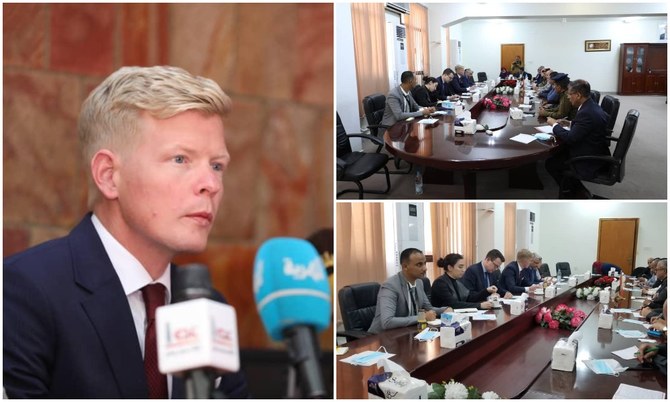AL-MUKALLA / NEW YORK: UN Yemen envoy Hans Grundberg on Monday visited the besieged city of Taiz in the country’s south, where he met the governor of Taiz, political party leaders, businessmen, activists and journalists, his office told Arab News.
A long convoy of armored SUVs and military vehicles were seen crossing into government-controlled sections of the city as local security authorities tightened security and sealed off streets around the governor’s office, residents said.
Taiz, Yemen’s third-largest and most populous city, has seen the bloodiest clashes between Yemeni government forces and the Iran-backed Houthis since early 2015.
The Houthis, who control the city’s edges, have laid siege to the city after failing to seize control due to strong resistance from army troops.
The militia has barred people from leaving or entering through checkpoints, obstructed humanitarian assistance to trapped people and repeatedly shelled loyalist neighborhoods to force a surrender.
“Coming … to Taiz for the first time is important,” Grundberg said after his meeting with the governor. “It is a place that encompasses so many things that are central to all of Yemen. There is political plurality, entrepreneurial spirit, cultural and historical richness, and the strength to address the pain and difficulties that this war has inflicted on its people.
“Taiz shares also the same pains as we see elsewhere in Yemen, (where) it is the civilians that bear the burden of this conflict.
“Here, as well, we have seen children killed or maimed, and most recently in the deplorable attack on Oct. 30 that claimed the lives of three children. And I would like in this respect to express my deep condolences to the family of these children.”
Local government and military officials urged Grundberg to use his leverage to pressure the Houthis into lifting the siege, ending attacks on residential areas and the use of landmines, and stopping the recruitment of children.
“Our demands are breaking the siege, ending the killing of children and civilians and women, and stopping attacks on hospitals and infrastructure in Taiz,” Abdul Basit Al-Baher, a Yemen army officer in Taiz, told Arab News by telephone, noting that Taiz residents feel that UN officials have “ignored their suffering.”
He said: “We want the UN to be fair and to treat us like the Houthis. The UN officials visit the Houthi militias who plant landmines and even give them cars and humanitarian assistance that fuel their military activities.”
On Sunday, Grundberg met Yemen’s prime minister and foreign minister in Aden to discuss peace efforts.
“He explored possibilities for de-escalation in Yemen, briefed his discussions in the region and shared his concerns on the impact of military operations in Marib,” the envoy’s office said on Twitter.
Grundberg is now trying to convince warring factions to immediately put into place a nationwide truce, which would include an end to Houthi attacks in Marib, and the lifting of restrictions on Sanaa airport and Hodeidah seaport.
In the same sense, US Special Envoy for Yemen Tim Lenderking on Monday touched down in Aden where he discussed with the Yemeni prime minister and foreign minister efforts to end the war, the Houthi offensive on Marib, the Riyadh Agreement and Yemeni government measures to safeguard the economy, state news agency SABA reported.
Foreign Minister Ahmed Awad bin Mubarak tweeted that he discussed in a separate meeting with the US delegation the impacts of Houthi military operations in Marib and peace activities to end the war. “I expressed our appreciation to the US for its continued support,” he said.
Meanwhile, on the ground, a local military official told Arab News on Monday that heavy clashes erupted between Yemeni government forces and the Houthis south and west of the central city of Marib.
In the west, dozens of rebel fighters were killed in heavy battles that continued from Sunday evening to Monday afternoon in Al-Kasara. “The clashes were very fierce. The national army managed to foil Houthi suicide attacks,” the official, who requested anonymity, said.
In the south, government forces engaged in fighting with the Houthis in Al-Amud and surrounding areas under heavy air cover from Arab coalition warplanes.
“Working for peace in Yemen is an uphill battle,” Grundberg said. “However, we should never forget that there is always a way to break the cycle of violence. There are always opportunities for peaceful dialogue. And the people of Taiz know this too well.
“All in all, Taiz is the reminder of the possibility of a pluralistic Yemeni state, and remains a key part of achieving sustainable peace in Yemen.”
















